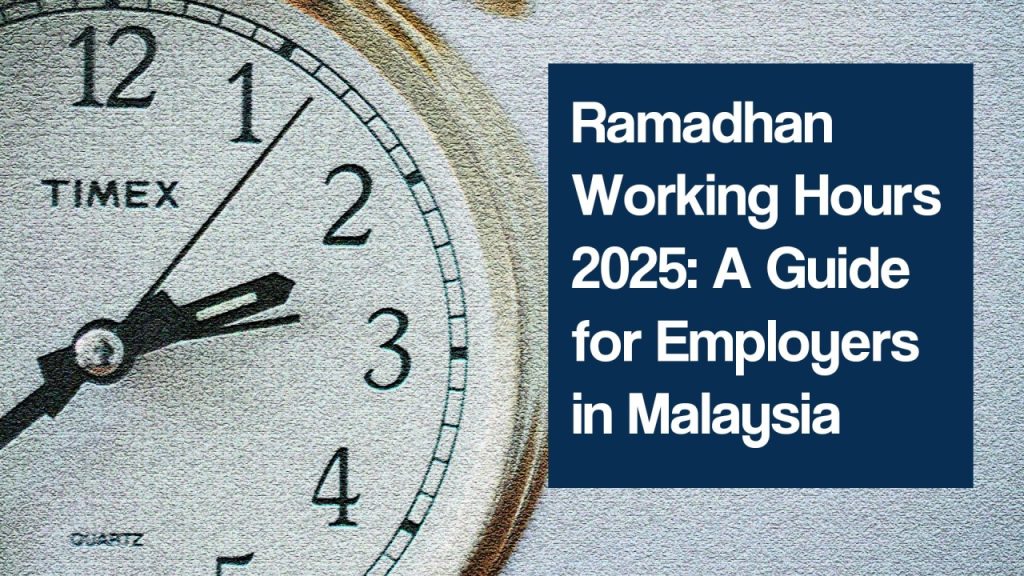Ramadan Working Hours 2025: A Guide for Employers in Malaysia

Ramadan is a sacred time for Muslims around the world, including in Malaysia, where a large portion of the workforce observes fasting from dawn to sunset. As an employer, it is important to accommodate the needs of your Muslim employees while maintaining productivity during this holy month. Ramadan working hours may vary depending on organizational policies and government guidelines, and it’s essential for employers to create a supportive work environment during this period.
In 2025, Ramadan is expected to begin around March 1st and end on March 30th (subject to moon sightings). During this time, it’s crucial for Malaysian employers to take into account both the spiritual and physical demands placed on fasting employees.
Why Ramadan Adjustments Are Important
For many Muslims, fasting during Ramadan involves abstaining from food, drink, and other activities from sunrise to sunset. This physical demand, combined with additional prayers and family commitments, can make it challenging for employees to maintain their usual work schedules and energy levels.
Providing flexibility in working hours not only supports the well-being of employees but also fosters a positive work environment. This flexibility can boost employee morale, enhance engagement, and demonstrate respect for religious practices.
Government Guidelines on Ramadan Working Hours in Malaysia
In Malaysia, the Employment Act 1955 does not specifically outline mandatory adjustments to working hours during Ramadan. However, many organizations voluntarily adjust work schedules to accommodate Muslim employees. In some cases, the public sector and certain states with a predominantly Muslim population may have specific guidelines. For example, government offices in states like Kelantan, Terengganu, and Kedah often implement shorter working hours during Ramadan. This is in line with the practice of creating a more comfortable and manageable work schedule for employees who are fasting.
For private sector employers, there is flexibility in designing work hours, as long as they remain within the legal requirements set by the Employment Act. Employers can adjust their policies based on the needs of their workforce, and many choose to offer reduced working hours or staggered shifts during Ramadan.
Best Practices for Employers During Ramadan
To create an inclusive and supportive environment during Ramadan, consider the following guidelines:
1. Adjust Working Hours
One of the most common accommodations during Ramadan is adjusting working hours. Employers can offer:
- Shortened workdays: Reducing work hours by an hour or more without affecting employees’ pay.
- Flexible start times: Allowing employees to start earlier in the morning and leave earlier in the afternoon, especially before Iftar (the meal to break the fast).
- Compressed workweeks: Offering the option to work extra hours on certain days in exchange for a shorter workday later in the week.
2. Allow Breaks for Prayers
Many Muslim employees may want to perform additional prayers throughout the day during Ramadan. Be considerate of this need by allowing time for prayer breaks, especially for the Zuhur (midday) and Asr (afternoon) prayers. Providing a quiet and private space for prayers is also a great way to support their spiritual practice.
3. Encourage Remote Work or Hybrid Models
If your organization supports remote work or hybrid models, allowing employees to work from home during Ramadan can offer greater comfort and flexibility. This option enables employees to manage their fasting routine, prayers, and family commitments without the added strain of commuting.
4. Provide Iftar Support
Employers can show additional support by offering light meals or snacks for employees to break their fast at the workplace. Alternatively, allowing employees to leave work early to prepare for Iftar with their families is a considerate approach.
5. Be Mindful of Meetings and Deadlines
Avoid scheduling important meetings, events, or deadlines late in the afternoon, when employees may feel more fatigued. It’s best to hold critical discussions earlier in the day when employees have more energy and focus.
6. Promote Understanding Among Non-Muslim Employees
Educating non-Muslim employees about Ramadan can foster greater understanding and empathy in the workplace. It can also prevent misunderstandings and create a more supportive work culture for everyone. Encourage an environment of mutual respect by ensuring that all employees are aware of the significance of Ramadan.
Legal Considerations
While the Employment Act 1955 does not mandate specific adjustments for Ramadan, employers should remain compliant with general labor laws concerning working hours, overtime, and leave entitlements. Any changes to work hours must still ensure that employees are not overworked or unfairly compensated.
Employers should also consider Section 60A of the Employment Act, which outlines the limits for working hours. According to the Act, employees should not work more than eight hours per day or 48 hours per week unless there are special agreements in place.
Creating a Ramadan-Friendly Workplace
As Ramadan approaches in 2025, employers in Malaysia need to adopt a flexible and supportive approach to working hours. Adjustments that accommodate fasting employees show respect for their religious practices and enhance overall workplace harmony. By fostering an inclusive environment, employers can ensure that both business operations and employee well-being are maintained throughout the holy month.
Sources:
- Employment Act 1955, Malaysia – Section 60A: Working Hours.
- Jabatan Kemajuan Islam Malaysia (JAKIM) – Ramadan Calendar and Guidelines.
- Human Resource Ministry, Malaysia – Employer Best Practices for Ramadan.
By taking these considerations into account, employers can help create a positive and productive workplace for all during Ramadan.




















